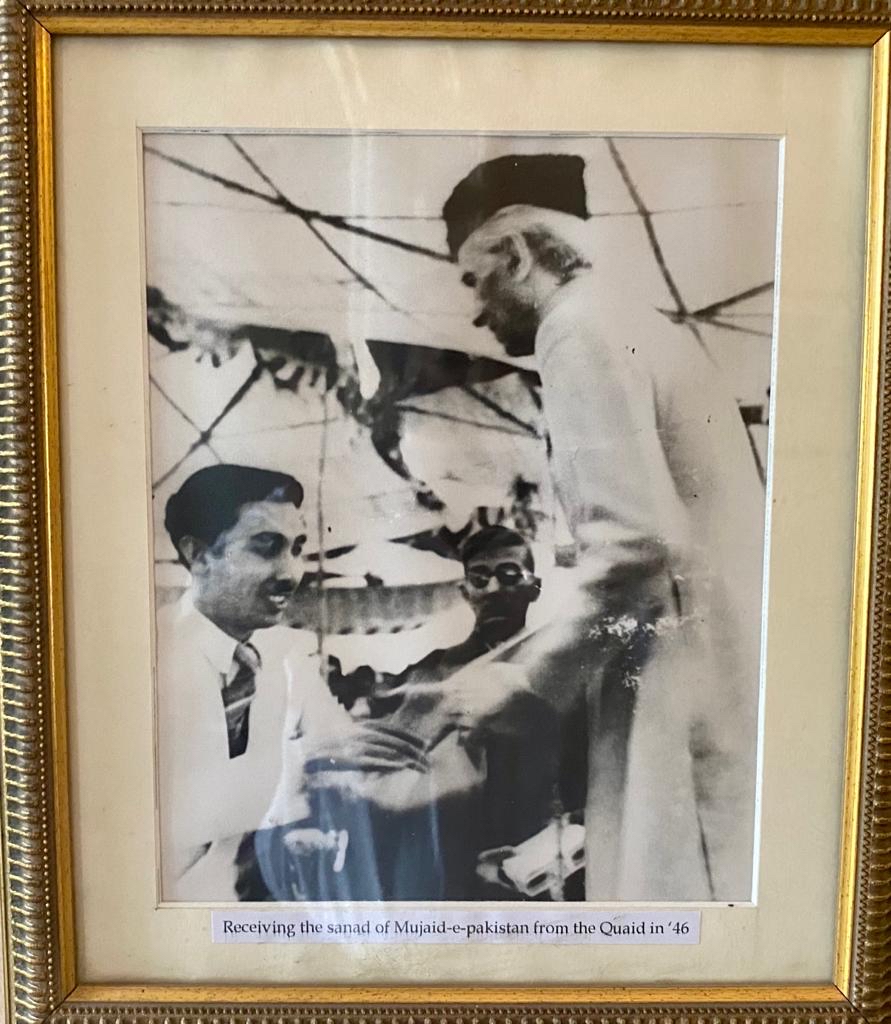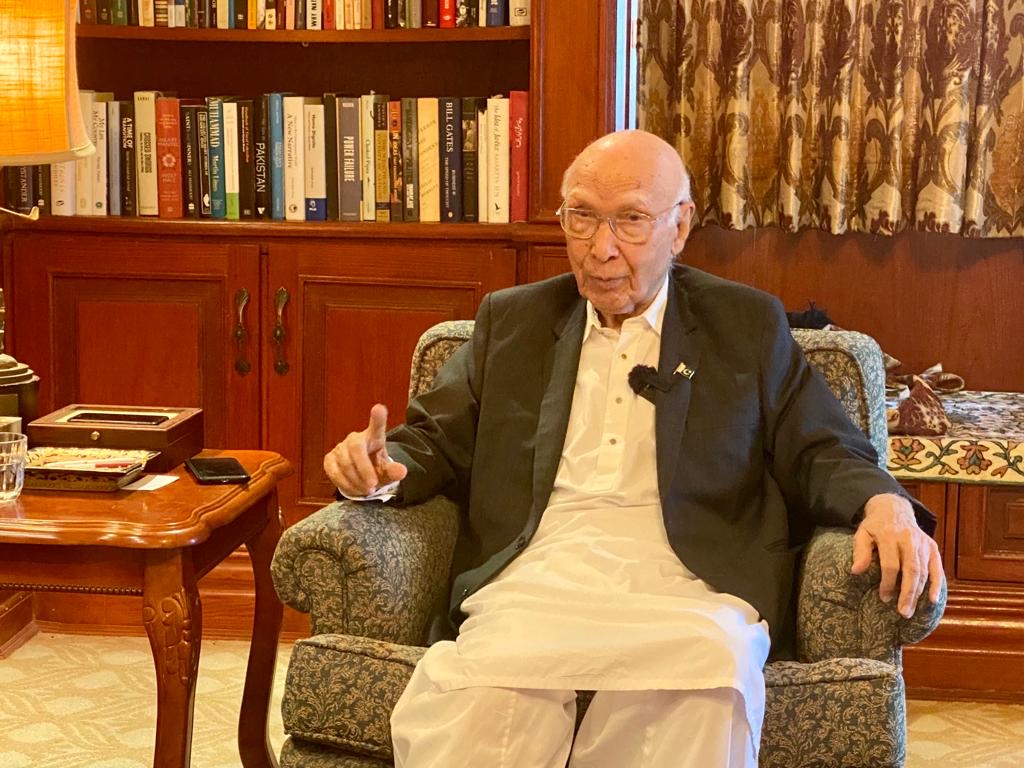ISLAMABAD: Sartaj Aziz, a veteran politician, bureaucrat and longtime observer of the vicissitudes of Pakistani history, said on the eve of the 75th anniversary of the country’s birth, that a major failure of the new nation’s democratic transition was the prevalence of a “military-managed system” in which political leaders had willingly provided a civilian facade to army rule.
Since its birth in 1947, Pakistan has spent several decades under military rule: 1958 – 1971, 1977 – 1988, 1999 – 2008. And even when the army has not ruled directly, it has retained an outsized role in the country’s politics, foreign policy and national security.
Aziz, 93, passionately championed the cause of Pakistan as a student activist and was part of the election campaign for India’s 1946 provincial polls, which were won by the All-India Muslim League and are believed to have laid the path to Pakistan’s independence.
“Pakistan was created through a democratic process because of the vote that we won in 1946, but unfortunately, we could not sustain the democratic process,” Aziz, who has a storied career as a civil servant and politician, told Arab News in an interview earlier this month.

Veteran politician Sartaj Aziz speaks to Arab News in Islamabad on August 4, 2022. (AN Photo)
“The first general election took place 23 years after Pakistan was born in 1970 … in the first 28 years, there were only five years of civilian rule,” the former head of the planning commission and an ex-national security adviser said. “That is our main structural fault, that we have not been able to sustain democracy.”
Aziz lamented that political leaders in Pakistan were a “product of a military-managed system” and had provided the army a “civilian facade.”
“Obviously when you don’t have democratic institutions working, then the political parties or the political process does not take root,” the nonagenarian said, adding that no civilian prime minister or government had been able to complete its tenure in a “military-managed system” and Pakistan’s economic potential was subsequently “sacrificed.”

A picture taken on August 4, 2022 in Islamabad, Pakistan, shows a framed group photo of Islamia College Lahore students with Quaid-i-Azam Muhammad Ali Jinnah. (AN Photo)
Another problem was a leadership vacuum in the country’s early years, including that the nation’s founder and first governor general Quaid-e-Azam Muhammad Ali Jinnah died a year after independence and Liaquat Ali Khan, the first prime minister, was assassinated in 1951.
“So, India made their constitution in 1950 but we could not agree on certain basic issues — how much provincial autonomy, parliamentary system or presidential system, and what’s the role of Islam — and it took us several years and in 1956 we got the first constitution,” Aziz said.

A picture taken on August 4, 2022 in Islamabad, Pakistan, shows a framed photo of a young Sartaj Aziz (left) is receiving Mujahid-e-Pakistan award from Pakistani founder Quaid-i-Azam Muhammad Ali Jinnah (right) in 1946. (AN Photo)
But in 1958, President Iskander Mirza declared martial law in Pakistan and abrogated the constitution of 1956. In March 1969, General Yahya Khan took over from Ayub Khan.
General elections were held in December 1970, with Zulfiqar Ali Bhutto winning in West Pakistan and the Awami League taking nearly all seats in East Pakistan, giving it an overall majority. However, Yahya and Bhutto refused to allow the Awami League to form a government and subsequently in December 1971, India and Pakistan fought a war over East Pakistan, leading to the creation of Bangladesh.
Yahya then handed power over to Bhutto, who took over as prime minister in 1973. In 1977, another military official, Army chief General Zia-ul-Haq, seized power and Bhutto was hanged two years later on a disputed conviction for conspiring to commit a political murder.
“Bhutto’s hanging was a very big mistake … Zia-ul-Haq obviously knew that if Bhutto survived then he can’t survive,” Aziz said, counting off what he considered some of the major failures of Pakistani history. “And the judiciary also admitted later on that it was a biased decision.”
Another blunder was Pakistan’s support for the Afghan resistance after the Soviet invasion of Afghanistan in 1979.
“That also is a question mark as to should we have done that or should we have not done that because we are still suffering from its consequences,” Aziz said, referring to Pakistan’s decades-old problem of militancy, which is believed to be a by-product of the Afghan war.
Speaking about the run-up to partition in 1947, Sartaj Aziz said the Pakistan movement was gaining steam when he joined Islamia College, Lahore, in 1944.
The new institute of learning had become a hub of politics and was frequently visited by Jinnah who wanted young students to help spread his demand for a separate Muslim homeland.

Veteran politician Sartaj Aziz speaks to Arab News in Islamabad on August 4, 2022. (AN Photo)
“He came to Lahore 15 times between 1937 and 1947 and 11 times he came to Islamia college in those 10 years,” Aziz, who became part of campaigning for Jinnah’s Muslim League in the 1946 provincial elections, said. “And I was lucky that three times out of those 11, I was present in the Islamia college.”
“The 1945-46 elections were very important because Quaid-e-Azam’s objective was to prove that All India Muslim League was the representative body of Indian Muslims,” Aziz added.
“We sent 1,250 students to different Punjab constituencies in the batches of 6, 8 and 10 to campaign for the Pakistan Muslim league. And as a result, we won almost 85 percent of the seats in Punjab and in the country, as a whole out of 484 seats, 87 percent of seats were won. So that election of 1946 proved that the All-India Muslim League was the true representative of Muslims.”
The victory led the path for Pakistan, Aziz said:
“After the 1946 elections, the British agreed that without dealing with the All-India Muslim league it will be difficult to find a solution.”
As a result of the successful election campaign, Jinnah awarded Aziz the Mujahid-e-Pakistan – or “Warrior of Pakistan” – certificate.
“Quaid-e-Azam said that you have received Mujahid-e-Pakistan, and now you become Memar-e-Pakistan, or builder of Pakistan, so that’s how I decided my future career.” Aziz said. “My father wanted me to become a lawyer but then I decided to become a development professional because Quaid-e-Azam wanted so. So, I went to Hailey College of Commerce, and my career was changed under Quaid-e-Azam’s instructions.”
“He [Jinnah] was very affectionate with the students and would sit on the grass with us,” Aziz recalled, smiling. “He had very informal contact with us and called us his selfless soldiers.”














